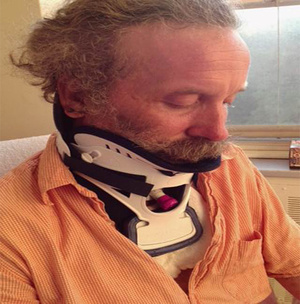PORTLAND — A Maine man who survived a polar bear attack in Canada said that going into the park unarmed was a risk he was willing to take, but he acknowledges, “It’s a gamble I nearly lost.”
Matthew Dyer, who was dragged from his tent by a bear a month ago, said he wouldn’t have traveled to the remote Torngat Mountains National Park in northern Labrador if he’d thought his safety depended on his ability to kill a bear.
“My desire to travel to wild areas like the Torngats will always be outweighed by the rights of the animals in that park to exist,” Dyer told The Associated Press in an email. “Life is full of risks, and going to the Torngats unarmed was a risk I was willing to take. It’s a gamble I nearly lost.”
The polar bear that attacked Dyer on July 26 crossed a portable electric fence designed to protect members of his group. Dyer was saved when a member of his party fired a flare, startling the bear and causing it to drop him.
Members of his group provided first aid for Dyer while waiting seven hours for a rescue helicopter. Eventually, he was airlifted to a Montreal hospital before coming home to Maine.
Dyer, who suffered neck injuries, had surgery earlier this week that left him temporarily unable to speak.
“I’m plugging along with my recovery. The bear busted me up pretty good, but I hope to be back to normal in a month or so,” he wrote from his home in Turner.
The 3,700-square-mile park features the dramatic Torngat Mountains, lakes, fjords and icebergs. It’s teeming with wildlife, including polar bears, which can top 1,000 pounds.
A member of the group, Dr. Rick Isenberg of Scottsdale, Ariz., told a Phoenix TV station that there were lots of bears around and that one bear in particular had been watching the group from a distance.
“We were being stalked. And what happened that night was a hunt,” Isenberg told KPHO-TV.
Parks Canada is investigating why the electric fence failed to deter the bear.
Park officials recommend that visitors hire an armed Inuit guide to protect against polar bears, but Dyer’s group hadn’t hired one. Canada’s indigenous Inuit people are the only ones allowed to have guns in the park.
Dyer is not convinced that an armed guard would have prevented the 2:30 a.m. attack. “In my case I fail to see how having anything other than a flare gun would have saved me,” he wrote.
Dyer, a lawyer at Pine Tree Legal Services that assists low-income Mainers, expects to make a full recovery.
“I’m feeling like it’s time for me to move on and focus on the future,” he wrote.
Send questions/comments to the editors.



Success. Please wait for the page to reload. If the page does not reload within 5 seconds, please refresh the page.
Enter your email and password to access comments.
Hi, to comment on stories you must . This profile is in addition to your subscription and website login.
Already have a commenting profile? .
Invalid username/password.
Please check your email to confirm and complete your registration.
Only subscribers are eligible to post comments. Please subscribe or login first for digital access. Here’s why.
Use the form below to reset your password. When you've submitted your account email, we will send an email with a reset code.